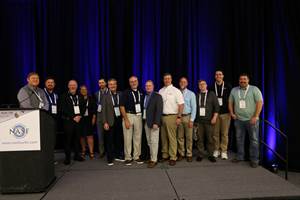The Zinc Plating Difference
It isn't the equipment, the chemicals or the process; it's the people...
The Wright brothers, Lewis and Clark, Rodgers and Hammerstein, Andrew MacDonald and Charlie Kelly, these dynamic partnerships have at least one thing in common. They are successful teams. But who are Andrew MacDonald and Charlie Kelly? They are the operators, managers and just a couple of the members of the total Torcad team.
When Messrs. MacDonald and Kelly started Torcad Ltd., Toronto, Ontario, it was a typical plating shop. Most lines were manually operated. Chemicals were added using shovels; parts were loaded into barrels using shovels. The facility offered many finishes: copper, nickel, tin, cadmium, lead and hot dip galvanizing.
In 1974, operations at Torcad began to change. "Mr. Kelly was plant manager and I was the general manager," noted Mr. MacDonald. "Charlie Kelly was the detail man, the engineer. He literally built this place with his own hands. I'm not an engineer. I'm a manager. He and I made the perfect combination."
In 1974, Torcad's vision was to become a volume-focused factory. It started by getting out of structural galvanizing and concentrating on spinner galvanizing and the bulk handling of small products. It wanted to add an automated phosphating system; however, the older building limited Torcad because the ceiling height was merely 14 ft. It did not stop the Torcad team, which simply added a taller extension to the older building to house the new line.
"As the business grew, we became more and more focused," Mr. MacDonald explained. "It took a while, but we began to realize there were two pressures on us. One was the economic pressure of making a profit at a time when there were several recessions. The second pressure was environmental." Torcad found that the environmental pressures drove the company toward a smaller number of finishes, since companies begin to focus on what they do best to minimize waste treatment requirements. For Torcad that was bulk handling of small parts for zinc and zinc phosphating.
"It took a while for us to realize this was the situation. It was 1996 before we got rid of cadmium, which was key," stated Mr. MacDonald. "Once we eliminated cadmium, we could eliminate all of our cyanide processes and switch to chloride zinc plating solutions."
Now Torcad boasts four automatic zinc-plating lines, two automatic phosphating lines, a semi-automatic dip/spin machine, an automated chromating line and a heat treatment line. Seventy-five percent of Torcad's work is automotive. In 1974 100% of its work was fasteners. Now it is 50% fasteners and 50% stampings. As the market has changed so has Torcad.
"We are not a highly structured company," noted Mr. MacDonald. "We give people personal responsibility for their job and the freedom to do their job. The biggest problem in operating anything is egos. You can't get rid of them, but you can reduce the impact by emphasizing how important everyone else is to the job and that a person cannot do his job alone."
Another area that has evolved is chemical management. "We have gone to great lengths to remove areas that were unprofitable or did not quite fit in with the company," Mr. MacDonald explained. Torcad does not buy chemicals. Mr. MacDonald evaluated the chemical supply business and felt there was no real difference between supply house chemistries. So rather than have representatives constantly calling, he switched the process around and said he would give all of Torcad's chemical business to whichever supplier accepted his proposal: The supplier is only paid if good work leaves the factory.
This puts a lot of pressure on the chemical supplier. It must supply Torcad with its best product so that Torcad can produce good work. It must cut costs by buying in bulk, reducing inventory and cutting back on salesmen calling. Solutions must be properly maintained, because every time there is a reject, the supplier is not paid, and it has to find out what is happening in the bath. No longer can you simply dump the solution and make up a new one.
The three suppliers working with Torcad are MacDermid Enthone for zinc plating solutions; PPG for zinc phosphating and chromating solutions; and Chemtech for the dip spin and manganese phosphate processes. Torcad contracted with each supplier for three years.
"With the contract we have not had to worry about chemical inventories, price fluctuations and sales people coming in and out. Quality has improved dramatically. Total rejects has dropped from 3.9 to 1.25% by weight," concluded Mr. MacDonald.
"But what really makes the difference," he continued, "are people. That's a nice, easy phrase to say, isn't it? But we do care about the people. You can buy plating solutions and machinery anywhere. What makes a difference between plating shops is the people."
Torcad tries to fit the job to the person rather than the person to the job, since it is easier to change a job than a person. However, you can only do this with an eye on the long term, because it takes three or four years to get the right situation (chemistry) established.
So when Mr. Kelly decided he wanted to retire, Torcad decided it needed to reorganize. You just cannot find people with 48 years experience to replace retiring plant managers. So, Messrs. Kelly and MacDonald started looking at what fit and what didn't fit into Torcad's future.
The first consideration was barrel repair. Torcad owns and uses hundreds of barrels. Therefore, it needs someone to repair them. Instead of doing the job in house, a Torcad employee left to own and operate a barrel repair shop. The barrel repair shop is just down the road, Torcad knows the owner and his history and the owner knows the history of the barrels. This provided Torcad confidence that the barrels were properly maintained while allowing them to eliminate the hassles of in-house barrel repair and the conflicting demands on the maintenance department.
The next area identified was transportation. They asked themselves if they were in the plating business or transportation business. Torcad's fleet included four tractors and 10 trailers, which had to meet safety regulations, be registered etc. So, Torcad offered its drivers the opportunity to purchase the vehicles and become owner operators. The drivers were enthusiastic about the proposition and Torcad eliminated trucking from the business.
"We eliminated transport, chemistry and barrel repair," noted Mr. MacDonald. "All that was left was to serve the customer. We are now plating fasteners and stampings for people we are in personal contact with daily. We know who we are working for and how important each job is to them. What may seem a rather insignificant piece, for which we get 10 cents, may be holding up a five-dollar piece. We know that and treat it with priority.
The services Torcad offers include barrel phosphating on its automated zinc phosphating line. The line has a capacity of 900 tons per week and is GM 6035M approved. The barrel zinc line is also used for chromating, dying and waxing and has a 600-ton per week capacity. This line uses JS 500 plating chemistry, which was actually developed by Torcad but is marketed through MacDermid (see sidebar). The dip/spin organic coating systems apply lacquers, paints, resins, oils and waxes. The systems have a 100-ton per week capacity.
The de-embrittlement line is an automated continuous gas-fired oven. Work is processed in perforated steel baskets for 5 hours at 205C. Loads are limited to 200-lb baskets, and system capacity is 150 tons per week.
"In a world where quality is expected, service is taken for granted and the prices are market driven, Torcad's edge is its people. Our employees take a personal interest in serving the customer, using their skills and the best of equipment to meet the customers' requirements," Mr. MacDonald summed up.
To learn more visit MacDermid Enthone and PPG.
Related Content
Advantages to Pumped Eductor Agitation
Not all agitation methods are created equally. Pumped agitation with eductor nozzles can improve process tanks and quickly show a reduction in operating costs while keeping staff safe, following environmental legislation and preventing pollution.
Read MoreAn Overview of Electroless Nickel Plating
By definition, electroless plating is metal deposition by a controlled chemical reaction.
Read MoreProducts Finishing Reveals 2023 Qualifying Top Shops
Each year PF conducts its Top Shops Benchmarking Survey, offering shops a tool to better understand their overall performance in the industry. The program also recognizes shops that meet a set of criteria to qualify as Top Shops.
Read MoreSuccessful South African Plater Beating the Odds
Remaining focused on quality and reliability, Team Plating Works stays profitable in a volatile and challenging economy.
Read MoreRead Next
Episode 45: An Interview with Chandler Mancuso, MacDermid Envio Solutions
Chandler Mancuso, technical director with MacDermid Envio discusses updating your wastewater treatment system and implementing materials recycling solutions to increase efficiencies, control costs and reduce environmental impact.
Read MoreA ‘Clean’ Agenda Offers Unique Presentations in Chicago
The 2024 Parts Cleaning Conference, co-located with the International Manufacturing Technology Show, includes presentations by several speakers who are new to the conference and topics that have not been covered in past editions of this event.
Read MoreEducation Bringing Cleaning to Machining
Debuting new speakers and cleaning technology content during this half-day workshop co-located with IMTS 2024.
Read More




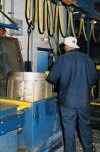
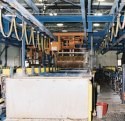
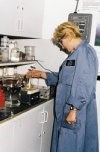









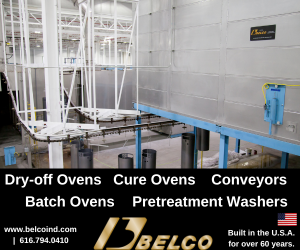
.jpg;maxWidth=300;quality=90)


